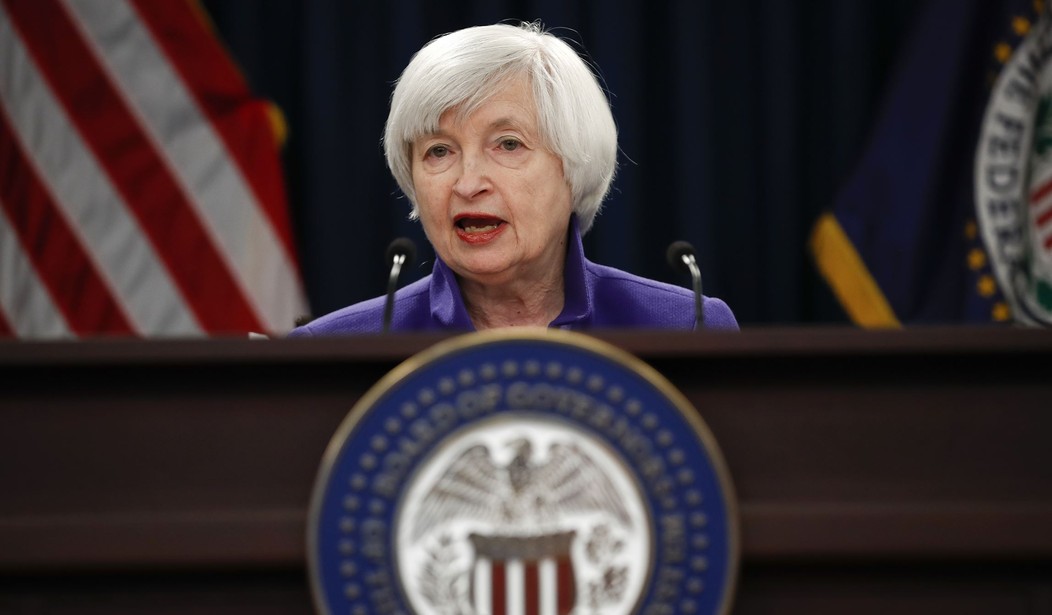Thursday's GDP numbers indicated a decline of 0.9 percent, pointing to a recession, considering the economy also declined by 1.6 percent last quarter. President Joe Biden and many others in his administration have denied we're even in a recession and have instead pointed to a different, more vague definition based on data from the National Bureau of Economic Research (NBER). Chief among the recession-deniers includes Treasury Secretary Janet Yellen, who gave remarks on Thursday.
TUNE IN: @SecYellen hosts a press conference to discuss America’s recovery over the last 18 months from the depths of the pandemic, and the resilience of America’s workers, businesses, and economy in the face of international headwinds. https://t.co/EjN1BxTnzr
— Treasury Department (@USTreasury) July 28, 2022
Instead of a recession, Yellen claimed during her remarks that the economy is "transitioning."
"This report indicates an economy that is transitioning to more steady, sustainable growth," she said. "That's to be expected given how rapidly the economy grew when it was recovering from the pandemic and all of those job losses."
Yellen also used problematic language when talking about inflation last year, when she claimed inflation would be "temporary" and was "transitory."
During a House Appropriations subcommittee hearing in May of last year, Yellen said, "My judgment right now is that the recent inflation that we have seen will be temporary. It's not something that's endemic."
In June of last year, Yellen was quoted singing a much different tune on inflation. From The Washington Post at the time:
Yellen, Fed Chair Jerome H. Powell and other top policymakers insist the price pops are temporary and that the current uptick doesn’t reflect a dangerously persistent new trend.
...
“We have in recent months seen some inflation, and we — at least on a year-over-year basis — will continue, I believe through the rest of the year, to see higher inflation rates, maybe around 3 percent,” Yellen said following a meeting of Group of Seven finance ministers in London. “But I personally believe that this represents transitory factors.”
Recommended
Ultimately, Yellen was forced to walk back her remarks and admit she was wrong. Last December, she acknowledged, "I'm ready to retire the word transitory," and said, "I can agree that that hasn't been an apt description of what we're dealing with."
She made an even more embarrassing admission earlier this year. "I was wrong then about the path that inflation would take. As I mentioned, there have been unanticipated and large shocks to the economy... that I, at the time, didn't fully understand," she claimed, despite being the Treasury Secretary and having previously served on the Federal Reserve, including as its chair.
Other economists, though, including Larry Summers, who served as Treasury Secretary under President Bill Clinton, warned that the American Rescue Plan Act would lead to inflation, which it did.
When promoting the NBER definition of a recession, as she did earlier in the week, including while on NBC's "Meet the Press," Yellen engaged in quite the tone-deaf claims about the American people.
"Most economists and most Americans have a similar definition of recession — substantial job losses and mass layoffs, businesses shutting down, private sector activity slowing considerably, family budgets [that] are under immense strain, a broad-based weakening of our economy," she claimed. "That is not what we're seeing right now. When you look at the economy, job creation is continuing, household finances remain strong. Consumers are spending and businesses are growing."
Despite what Yellen may claim in her remarks, the polls are not on her side.
A USA Today/Suffolk University poll released on Thursday, shortly before the GDP report came in, shows that 50 percent of Americans say we're in a recession already, while just 9 percent say we're in a recovery.
An IBD/TIPP poll from earlier this month found that 58 percent of respondents think we're in a recession.
Multiple polls reflect that Americans think we're already in a recession, actually, and that they even did last month.
This includes a poll from The Economist/YouGov, which found that 56 percent of respondents thought we were already in a recession. A survey from MagnifyMoney conducted around the same time found that 70 percent of respondents thought the United States was headed toward a recession, with 59 percent predicting it would come within the next six months.
The American people continue to give President Biden low marks on the economy. According to RealClearPolitics (RCP), 32 percent approve of his handling of this top issue, while 63.7 percent disapprove.
One particularly memorably bad poll from earlier this month included a CNBC poll, which showed just 1 percent of respondents believe the economy is "excellent," while 10 percent believe it's "good."

























Join the conversation as a VIP Member